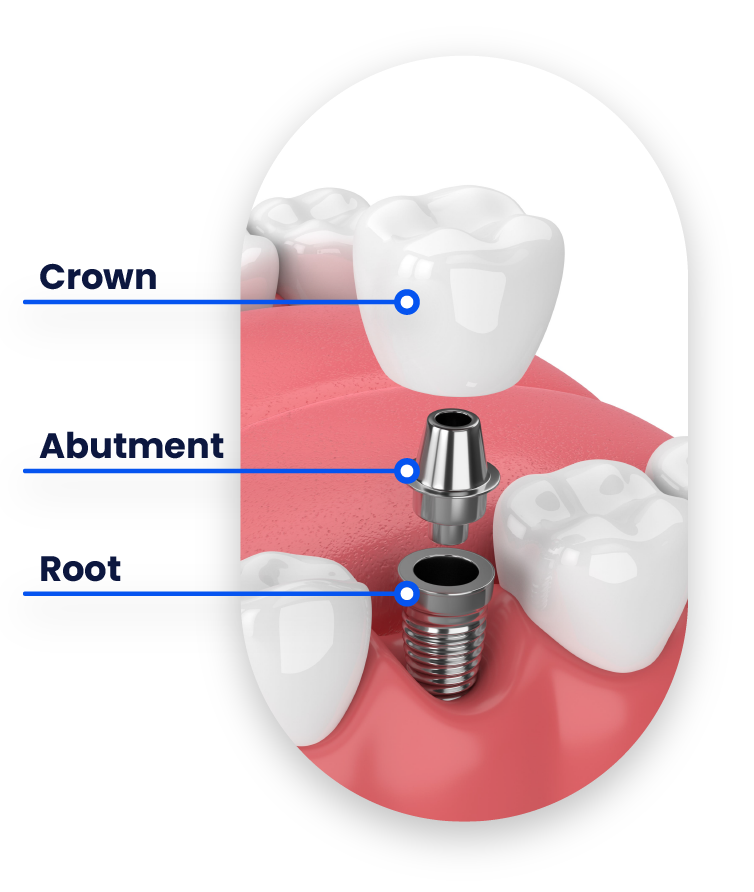Implant Supported Dentures in Memphis TN
Implant Supported Dentures in Memphis TN
OR CALL (901) 300-4162
At Periodontal Associates of Memphis, our highly skilled and board-certified periodontists take pride in offering advanced periodontal and dental implant treatments. By blending state-of-the-art technology with personalized care, we help patients in Memphis, TN and surrounding communities restore their smiles, confidence, and quality of life.

Understanding Dental Implants
- Titanium Post (Root): A small screw-like post made from biocompatible titanium is inserted directly into the jawbone. Over time, the bone naturally fuses with the titanium during a process known as osseointegration, creating a stable foundation.
- Abutment (Connector): Once healing is complete, an abutment is attached to the titanium post. This serves as the link between the implant and the visible restoration—whether that’s a crown, bridge, or in this case, a denture.
- Prosthetic (Crown or Denture): The final piece is the visible restoration. For patients needing only one or two replacements, an artificial tooth (crown) is common. For those missing multiple teeth, a custom denture that snaps onto the abutments can be used.
dental implants mimic the function of natural tooth roots, offering a long-lasting and sturdy base for your new teeth.

Why Consider Implant-Supported Dentures?
- Security and Stability: With implant posts acting as anchors, the denture remains firmly in place during daily activities like eating and speaking.
- Improved Comfort: Say goodbye to messy adhesives and the constant worry of your dentures slipping. Implant-supported dentures distribute bite force more evenly, reducing gum irritation and discomfort.
- Aesthetics: Modern denture materials are designed to resemble natural teeth and gums closely. When combined with the proper support of implants, your new smile can appear more natural than ever.
- Bone Health: Implants help stimulate the jawbone, reducing the bone loss that occurs when teeth are missing. This can help maintain the contours of your face, preventing the sunken appearance often associated with long-term denture wear.
- Long-Term Investment: While the up-front cost might be higher than traditional dentures, the stability and durability of implant-supported dentures can make them a better long-term financial choice.

The Implant-Supported Denture Procedure
- Initial Consultation and Examination: Your journey begins with a comprehensive evaluation at our Memphis office. Our periodontists will assess your overall oral health, review X-rays or 3D scans, and discuss your goals and concerns. We’ll also check if you have enough healthy jawbone to support implants.
- Customized Treatment Plan: If you’re a suitable candidate, we’ll design a personalized treatment plan to determine the optimal placement of each implant. This phase can also involve any prerequisite treatments, such as bone grafting if your jawbone density is insufficient.
- Surgical Placement of Implants: During a minor surgical procedure under local anesthetic (and optional sedation), the titanium posts are placed into the jawbone. While some patients worry about pain, most report minimal discomfort, as the procedure is carefully managed with anesthesia and post-operative guidelines.
- Healing Period (Osseointegration): Once the implants are placed, a healing period of three to six months typically follows, giving the bone time to fuse with the implants. This step is critical for long-term stability.
- Denture Placement: After osseointegration is complete, abutments are attached to the implants. A new or existing denture will then be modified or fabricated to snap securely onto these abutments, giving you a comfortable and stable fit.
Implant-Supported Dentures vs. Traditional Dentures
- Retention and Stability: Traditional dentures rely on suction and adhesives, which can lose effectiveness over time. Implant-supported dentures, however, are firmly attached to implants, eliminating slippage.
- Comfort and Bone Health: Standard dentures sit on top of the gums, sometimes causing irritation. Implant-supported dentures reduce pressure on the gums and help stimulate the jawbone, preventing bone deterioration and maintaining facial structure.
- Maintenance and Care: Both types of dentures require cleaning and regular dental checkups. However, implant-supported dentures generally demand less day-to-day hassle, as you won’t need adhesives and can easily snap them off for thorough cleaning.
- Longevity and Investment: Traditional dentures may need to be relined or replaced more frequently due to changes in gum and bone structure. Though implant-supported dentures often have a higher initial cost, they can provide better long-term value.
Cost of Implant-Supported Dentures
- Number of Implants: Depending on your jaw structure and the design of your denture, four or more implants may be required to secure the prosthetic denture in place.
- Type of Materials: Premium materials for crowns, abutments, or denture bases can influence the overall cost.
- Additional Procedures: If you need treatments like bone grafts or gum disease therapy beforehand, these will add to the total expense.
Although the price can vary, many patients find that implant-supported dentures are well worth the investment, thanks to their durability, comfort, and potential to prevent more costly interventions in the future.
Is the Procedure Painful?
The Healing Process
- Maintain Good Oral Hygiene: Keep the surgical site clean using a soft-bristled toothbrush or any special rinses recommended by your periodontist.
- Follow Dietary Guidelines: In the weeks after surgery, stick to softer foods and avoid placing too much pressure on the implants until they have integrated.
- Attend Follow-Up Appointments: Regular checkups allow us to monitor your healing progress, adjust your dentures if necessary, and ensure everything is on track.
Caring for Your Implant-Supported Dentures
- Daily Cleaning: Remove your dentures at night (if advised) and clean them thoroughly. Use a soft-bristle toothbrush or denture brush to remove any debris.
- Rinse and Soak: Some implant-supported dentures can be soaked in a mild cleaning solution, but always follow your dentist’s guidelines.
- Oral Hygiene: Even with dentures, you must brush your gums and any remaining natural teeth to keep your mouth healthy. Pay special attention to the area around the implants.
- Regular Dental Checkups: Your periodontist will periodically evaluate your implants and dentures to ensure they’re functioning correctly.
Am I a Candidate for Implant-Supported Dentures?
Ideal candidates for implant-supported dentures typically have:
- Adequate Jawbone Density: Enough bone structure to support implants (although a bone graft can sometimes remedy this if your bone is deficient).
- Healthy Gums: Good periodontal health is crucial for implant success.
- Overall Good Health: Certain medical conditions, like uncontrolled diabetes or heavy smoking, may affect healing times, but each case is evaluated on an individual basis.
If you’ve struggled with tooth loss, ill-fitting dentures, or are simply looking for a more long-term solution, speak with our team at Periodontal Associates of Memphis. We can advise if implant-supported dentures are right for your unique situation.
Combining Dentures with Dental Implants: What to Expect
Long-Term Benefits and Peace of Mind
Schedule Your Consultation in Memphis, TN
Ready to find out if implant-supported dentures are right for you? At Periodontal Associates of Memphis, our board-certified periodontists offer unparalleled expertise and a compassionate approach. We invite you to schedule a consultation and discover how we can help transform your smile and enhance your quality of life.
Take the first step toward a more comfortable, stable, and radiant smile—contact us today!
MEET YOUR MEMPHIS DENTAL IMPLANT EXPERTS
Dr. Godat, Dr. King & Dr. Byakina
Our team is dedicated to providing a personalized approach to each patient’s dental implant journey. From the initial consultation to post-surgery follow-up, we’ll guide you every step of the way, ensuring that your experience is as comfortable and successful as possible.

